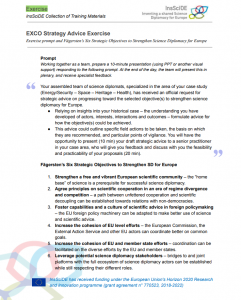EXCO Strategy Advice Exercise

In this exercise students practice formulating advice for achieving specific strategic objectives related to SD and present it to a mock ‘Executive Committee’ (EXCO). It is ideally performed in a multidisciplinary and international environment in which individuals in each group contribute unique expertise and viewpoints. The exercise is rooted in six strategic objectives outlined in InsSciDE’s recommendation for European SD strategy (Fägersten) and includes the use of case studies.
Strategy Advice to EXCO Scenario
A scenario exercise about achieving strategic objectives to strengthen science diplomacy for Europe
Exercise_EXCO Strategy Advice_InsSciDE CTM
CATEGORY: Simulation Exercise
Introduction
In this exercise students practice formulating advice for achieving specific strategic objectives related to science diplomacy and present it to a mock ‘Executive Committee’ (EXCO). It is ideally performed in a multidisciplinary and international environment in which individuals in each group contribute unique expertise and viewpoints. The exercise is rooted in six strategic objectives outlined in InsSciDE’s recommendation for European SD strategy (Fägersten) and includes the use of case studies.
Learning Objectives
● Deepen understanding of 1-2 strategic objectives for science diplomacy
● Be able to discuss how the strategic objectives apply to a case study on a related subject
● Expand thinking around the strategies and objectives at play behind SD practices
● Be able to support strategic thinking with ideas or context grasped from a historical case
study (linking history to the present and future).

Exercise_EXCO Strategy Advice_InsSciDE CTM
Fägersten’s Six Strategic Objectives to Strengthen SD for Europe
1. Strengthen a free and vibrant European scientific community – the “home base” of science is a prerequisite for successful science diplomacy.
2. Agree principles on scientific cooperation in an era of regime divergence and competition – a path between unfettered cooperation and scientific decoupling can be established towards relations with non-democracies.
3. Foster capabilities and a culture of scientific advice in foreign policymaking – the EU foreign policy machinery can be adapted to make better use of science and scientific advice.
4. Increase the cohesion of EU level efforts – the European Commission, the External Action Service and other EU actors can coordinate better on common goals.
5. Increase the cohesion of EU and member state efforts – coordination can be facilitated on the diverse efforts by the EU and member states.
6. Leverage potential science diplomacy stakeholders – bridges to and joint platforms with the full ecosystem of science diplomacy actors can be established while still respecting their different roles.
Materials
- Prompt and list of Fägersten’s Six Strategic Objectives to Strengthen SD for Europe
- Science diplomacy case studies – InsSciDE and S4D4C
- Recorded presentations of select case studies available on InsSciDE’s YouTube channel in the WSDS 21 playlist.Exercise_EXCO Strategy Advice_InsSciDE CTM
Optional materials
- Science diplomacy basics from the European Science Diplomacy Online Course.
- Full recommendation on European SD strategy, containing Fägersten’s Strategic Objectives: ‘Leveraging Science Diplomacy in an Era of Geo-Economic Rivalry Towards a European strategy’
- Recorded lectures:
- Power, Actors and Interests of European Science Diplomacy – WSDS21 (Fägersten, 2021)
- Linking the Past, Present and Future in Science Diplomacy Strategy – WSExercise_EXCO Strategy Advice_InsSciDE CTMDS21 (Fägersten, 2021)
- External experts to engage with students’ presentations